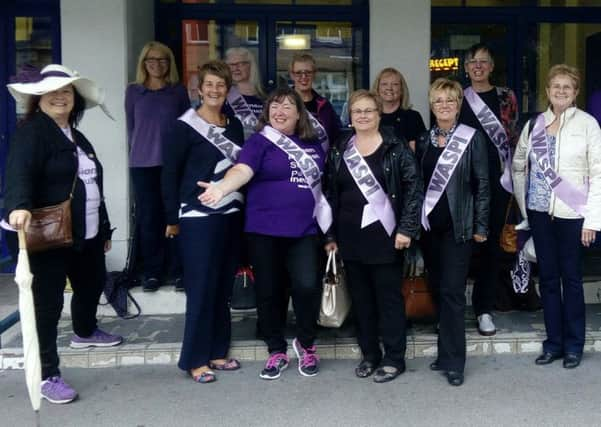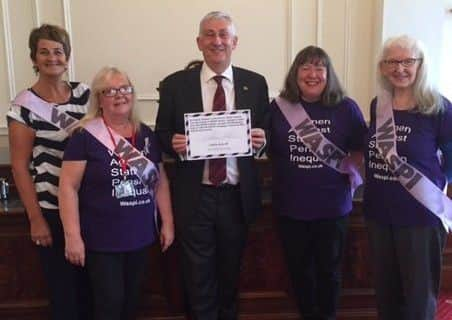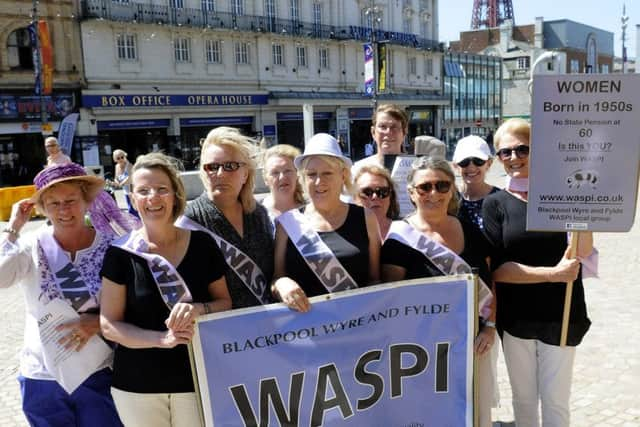Angry? You bet they are '“ the WASPIs are fuming


They are middle-aged, grumpy and angry.
And, unlike many men of a similar age, they have every right to be.
They are the women who are losing out because of an accident of birth.


Advertisement
Hide AdAdvertisement
Hide AdThey are the women who have been told to work for several extra years before they can claim their state pensions. That’s three years or more of lost income, lost peace of mind and possibly more full-time work to make ends meet.
And all at a time when their energy levels are starting to fall and they should be looking forward to (or already enjoying) retirement.
When the contributory State Pension was introduced in the 1940s, it had a differential State Pension Age – 65 for men and 60 for women.
The Pensions Act 1995 provided for the SPA for women to increase from 60 to 65 over the period April 2010 to 2020.


Advertisement
Hide AdAdvertisement
Hide AdThe Coalition Government legislated in 2011 to accelerate the latter part of this timetable, starting in April 2016 when women’s SPA was 63 so that it will be 65 in November 2018. The equalised SPA will rise to 66 by October 2020.
Some women born in the 1950s argue they have been hit particularly hard, with significant changes to their SPA imposed with a lack of appropriate notification.
The campaign Women Against State Pension Inequality (WASPI) is calling for “fair transitional state pension arrangements,” which they say translates into a ‘bridging pension’ paid from age 60 to SPA.
Here’s an example that is all too common.Two women work side by side in a Lancashire office. Let’s call them Susan and Mary.


Advertisement
Hide AdAdvertisement
Hide AdSusan is 63 ,has only ever worked part-time and has taken career breaks to bring up her children. She receives her state pension and works part time.
Mary is 61. She has worked full time since 16 and still runs her own business while working part-time in a another job.
She won’t get her state pension until she is 66. That’s three years later than Susan and five years more than others not too long ago.
Mary has been told that if she doesn’t keep up her NI contributions she will get a reduced pension.


Advertisement
Hide AdAdvertisement
Hide AdShe is furious – and thousands of pounds worse off than some of her colleagues.
The number of complaints from women adversely affected by the increase in the age they qualify to receive their pension has reached more than 700 amid cross-party calls for compensation for affected women.
In a letter sent in response to a complaint raised by one supporter of the WASPI campaign the Independent Case Examiner said: “Given the large number of Waspi complaints we have received, a dedicated team will be established in October 2017.”
Waspi women are urging the Government to properly compensate them. They say they did not receive adequate notice of the equalisation of state pension age, and so did not have time to prepare financially to qualify for their pension at an older age.
Advertisement
Hide AdAdvertisement
Hide AdChrissie Fuller, of the Chorley WASPI Support Group, is a widow. She said: “I received a letter from the DWP three months after my husband died, informing me that my State Pension Age would be 66.
“I naively believed that when I got to 60 I would get Pension Credit to see me through. One month before my 60th birthday I checked online and found out that I wouldn’t get it.
“Luckily, I have a new partner and together we run a very small printing business and I also have a ‘zero hours’ job as a wine adviser.
“I don’t earn a lot of money but am able to get by on my disability benefit and working tax credits.
Advertisement
Hide AdAdvertisement
Hide AdChrissie added: “At the grand old age of 60 I am now embarking on a new career as a freelance journalist specialising in politics and social media. I am just about managing,. ”
“I live in fear of becoming mentally incapacitated through a stroke or something similar because then it would all be over. I would have nothing to live off.
“That’s why I decided to form the WaspiChorleySupportersGroup to help promote the WASPI Campain and encourage others to do the same. Together we CAN make a difference!”
“Tina” of Chorley said: “I have osteoporosis and suffer constant pain especially in my knees which are always swollen. Nothing can be done for it until the condition worsens so I have to soldier on. I have to keep working to support myself.”
Advertisement
Hide AdAdvertisement
Hide AdDuring a debate in Westminster on the issue, pensions minister Guy Opperman said the government would not change laws, but highlighted “extended apprenticeship opportunities” to get older people into work.
That provoked a furious reaction from campaigners the length and breath of the country.
Fylde women were among those who reacted angrily after government chiefs refused to listen to calls for a review. Jackie Marsden, Blackpool Wyre and Fylde WASPI local group co-ordinator, said: “The minister’s response was wholly inadequate and did not properly address the injustice suffered by women born in the 1950s.”
Campaigners insist they are not opposed to the SPA rise - they say they have not been given enough time to make financial arrangements for a later retirement .
Advertisement
Hide AdAdvertisement
Hide AdOn the Fylde, there are around 250 women who were part of the WASPI campaign. One said: “It took the choice away, the plan away, everything – how can that be justified? ”
A DWP spokesperson said: “The decision to equalise the State Pension age between men and women was made over 20 years ago and achieves a long-overdue move towards gender equality. There are no plans to change the transitional arrangements already in place.
“Women retiring today can still expect to receive the State Pension for 25 years on average – several years longer than men.”